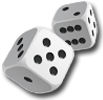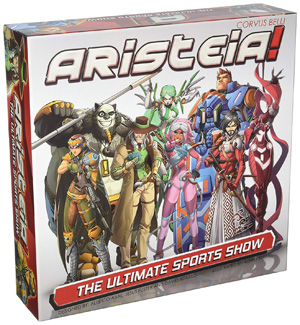



play board games
Board game reviews, strategy tips & session reports
Aristeia! Board Game Review
 Stats:
Stats:
No. of players: 2
Amount of time to play: 60-90 min
Age requirements: 14+
Set-up time: 5 min
Aristeia! is a two-player skirmish miniature games in which you must control certain areas of the board to score Victory Points and win.
Aristeia! Rules Description:
You begin Aristeia! by selecting your team of four characters. The core box comes with eight characters. So you can make two teams. There are suggested teams in the rules or you can draft a team if you like. Buying expansions adds more options for team building.
Once you select your team you create your Tactics deck. It consists of ten Standard cards that help your entire team and two character specific cards for each member of your team. You begin the game with four Tactic cards.
Aristeia! is played over played over five rounds or until one player scores eight or more Victory Points (VP)s. Each round, you determine initiative, take actions, score and recover.
Each character has an initiative card which you select and place face down on your player board. Starting from left to right both players flip their card in the first slot. The character with the higher initiative value chooses who goes first that turn. Initiative cards are also used at the start of the game to determine the Underdog. Each player totals up their Initiative card values and the player with the lowest total starts as the Underdog. This lets them choose the order when two simultaneous actions need resolved.
On your turn you spend all your character’s action points to move, fight and use any special abilities your character has. After both characters have used their action points, the players flip the initiative card in the second slot. Again the character with the higher value chooses who goes first.
Combat and power use is resolved with special dice that have one or more success, block or special symbols. The attacking character rolls the dice listed in their attack and the defender rolls their defense dice. Both characters add up their successes, block symbols and special symbols. Then the attacker assigns their results to the attack, or special power. Then the defender does same. Any successes that aren’t used to trigger a power are considered hits. Each block eliminates one hit.
Some powers resolve when your roll a success and the rolls are not opposed. You roll to activate the power and just need one or more successes for it to work.
If a character takes damage greater than their health they are put in the infirmary. When you eliminate an opposing character you get a frag token. Eliminated characters return in later rounds but start out with less action points for a couple rounds.
After all characters have acted, you check the score. Each round there is a designated scoring area on the board that will score in one of three ways. You score 3 VPs if only your characters are in the scoring area. If you have more characters in the scoring area you get 2 VPs. If both players have the same number of characters in the scoring area both players score 1 VP. At this point the player with the least VPs becomes the Underdog.
During recovery players are moved from the infirmary to the bench in order to be deployed the next round. Both players draw a Tactic card. And if you scored at one or more VPs this round you gain an additional Tactic card.
The game ends once eight or more VPs are scored or if you end five rounds. If you are tied frag tokens are the tie breaker.
Quick Review of Aristeia!:
Aristeia! is a fun mix of combat and area control. The miniatures look great and the characters have some cool synergies. There are different scenarios in the rules and even more online here.
The components for this game are excellent. I already mentioned the miniatures, but the art and board are also top notch. The rules are pretty good but the quick-start rules are missing a few things. The reference book is pretty thorough and should be able to answer most questions.
I really like the initiative system and how the character with the higher initiative decides who acts first. You need to decide the order you want you characters to act in the round. But do you want them to be able to react to your opponents turn. Will they die if they don’t act first? Does letting your opponent go first give them the upper hand for scoring? These are all important questions you need to consider.
Combat is important, but it doesn’t always help you win the game. Yes, it can help remove players from the scoring area, but usually positioning and moving your characters (or your opponents) matters more for VPs. It strikes a nice balance between these mechanics.
The eight characters included in the base game are great but you’ll want more. The expansions add more characters which are needed for you to identify and create more team synergies.
If you are looking for a fun skirmish game for two, pick up Aristeia! You just might want to grab one of the expansions too. For additional replay value.
Score and synopsis: (Click here for an explanation of these review categories.)
Strategy 4 out of 6
Luck 5 out of 6
Player Interaction 5 out of 6
Replay Value 4 out of 6
Complexity 4 out of 6
Fun 5 out of 6
Overall 5 out of 6

Leave a Reply